|
|
|
Sort Order |
|
|
|
Items / Page
|
|
|
|
|
|
|
| Srl | Item |
| 1 |
ID:
193485
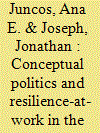

|
|
|
|
|
| Summary/Abstract |
International crises, most recently the Covid-19 pandemic and Russia’s invasion of Ukraine, often radically change our view of the world and our place within it. The European Union (EU) has been particularly impacted by these developments because these crises have accentuated some of its ontological and epistemological uncertainties and insecurities. While the EU’s resilience turn initiated by the EU Global Strategy of 2016 aimed at strengthening the EU’s ability to prepare and recover from external shocks and crises, since then, the concept of resilience has undergone a transformation. In recent years, we have seen the EU turning back in on itself and abandoning the radical aspects of resilience. Hence a paradox has emerged – the more complex the problems faced by the EU, the more it turns away from the logics of complexity present in the idea of resilience. In this article, we examine this conceptual shift through the lenses of concepts in action and the way these have reflected changes in the external context, but also power coalitions and institutional path dependencies. This argument will be explored by examining the recently adopted Strategic Compass and the EU’s Recovery and Resilience Facility (RRF).
|
|
|
|
|
|
|
|
|
|
|
|
|
|
|
|
| 2 |
ID:
149498
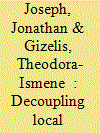

|
|
|
|
|
| Summary/Abstract |
Civil society organizations and grassroots groups are often unable to play an active role in post-conflict reconstruction and peacebuilding. A possible explanation for the observed challenges in peacebuilding is the gap or decoupling between international expectations and norms from practical action, local norms and capacities. External actors are often overly instrumental and operate according to a general template that fails to start from what the local capacities might actually be. This often leads to the decoupling of general values from practical action, which helps account for the observed barriers of engaging local civil and community organizations in reconstruction. We examine the different types of decoupling and the challenges these present. We evaluate our general theoretical argument using evidence based on the experiences of Liberian women’s civil society organizations. Given the compliance of the Liberian government with international norms, we should expect external actors to have an easier task in incorporating civil society and women’s organizations in the post-conflict reconstruction process; yet, the record appears to be the opposite. While we present the ‘tragic’ aspect of this relationship between international norms and local practice, we also suggest opportunities for ‘hybrid’ alternatives.
|
|
|
|
|
|
|
|
|
|
|
|
|
|
|
|
| 3 |
ID:
072698


|
|
|
|
|
| Publication |
2006.
|
| Summary/Abstract |
Justin Rosenberg gives a very interesting account of the conditions that produce the globalization literature and provides a compelling critique of the theory itself. I want to supplement this with an account of the social conditions that sustain such views. In short, my project is to relate globalization theory to contemporary forms of governmentality and to neo-liberalism in particular. Ultimately this leads me to slightly different conclusions. That is, not the death of globalization theory, but the way it interacts with and is sustained by contemporary practices, techniques and technologies of governmentality.
|
|
|
|
|
|
|
|
|
|
|
|
|
|
|
|
| 4 |
ID:
145978
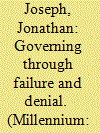

|
|
|
|
|
| Summary/Abstract |
This article sets out a new way of understanding how resilience works as a form of governmentality with specific focus on international interventions. It argues that resilience governs though failure and denial, suggesting that it builds on both failures to govern complex systems and past failures of intervention, in order to promote a new governance through denial that further shifts responsibility onto the governed. It suggests that resilience, rather than being a radical new approach, fits with existing discourse and practices, but offers something new in terms of its approach to knowledge, the social, and the human. Running this through the themes of failure and denial, the article suggests that resilience offers certain possibilities for human action, but that its emancipatory potential is largely constrained by the way it limits how we understand the bigger picture. This is explored in relation to international interventions and the way that resilience contributes to global governmentality.
|
|
|
|
|
|
|
|
|
|
|
|
|
|
|
|
| 5 |
ID:
081203


|
|
|
|
|
| Publication |
2008.
|
| Summary/Abstract |
This article argues for a concept of hegemony that goes beyond current usages in IR to examine its more structural aspect. First, it looks at this more structural aspect in relation to some of Gramsci's own arguments. Then it adds hegemony to the structure-agency debate. It develops the concept of hegemony in two ways - first as a mediating moment between structure and agency, second as a factor in securing the unity of structural combinations. These arguments are in turn dependent upon a scientific realist ontology that sees structure as more than just intersubjective relations. Finally, the article tries to show how this reworked concept of hegemony allows for a social theory of international relations, while respecting the specificity of the international.
|
|
|
|
|
|
|
|
|
|
|
|
|
|
|
|
| 6 |
ID:
101517
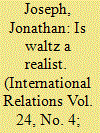

|
|
|
|
|
| Publication |
2010.
|
| Summary/Abstract |
In the opening chapter of Theory of International Politics Waltz makes an interesting distinction between scientific laws and theory construction. Recent special issues of this journal have suggested that this distinction allows Waltz to be read in different ways - for example, as a scientific realist who conceives of unobservable entities, or as a constructivist interested in how we create models. This contribution argues against both these interpretations by analysing the first chapter of Waltz's book and suggesting that his distinction between theories and law-like statements is fully consistent with mainstream discussions in the philosophy of social science. It argues that Waltz's position still depends on the identification of empirical regularities, something that makes him an empirical realist, but which undermines the claim that he is a scientific realist.
|
|
|
|
|
|
|
|
|
|
|
|
|
|
|
|
| 7 |
ID:
097733
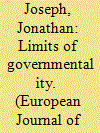

|
|
|
|
|
| Publication |
2010.
|
| Summary/Abstract |
Foucault's concept of governmentality goes beyond the narrow limits of state power to look at how these societies employ more subtle methods of power exercised through a network of institutions, practices, procedures and techniques which act to regulate social conduct. This approach is now gaining influence in International Relations and this piece reflects on this emerging field and tries to steer the debate in a certain direction. It is concerned to explore the limitations of the concept as a social theoretical explanation and also as an account of the international domain. It suggests that because the international domain is highly uneven, governmentality can only usefully be applied to those areas that might be characterized as having an advanced form of liberalism. To explain these limits requires that governmentality be set within a wider theorization of social context.
|
|
|
|
|
|
|
|
|
|
|
|
|
|
|
|
| 8 |
ID:
171161


|
|
|
|
|
| Summary/Abstract |
The article provides a critical overview of the rise of resilience at the European Union (EU) level and to what extent its adoption is reshaping the terms of the EU’s peacebuilding interventions. It argues that resilience offers a four-fold contribution to promoting sustainable peace: (1) a focus on complexity; (2) a systems approach; (3) a shift toward local capacities; and (4) an emphasis on human agency. The article then applies this framework to assess the implementation of the EU’s “resilience turn” since the adoption of the EU Global Strategy in 2016. Focusing on the EU’s discourse and its peacebuilding practices in the Western Balkans, the evidence suggests that the EU has only embraced a systems/integrated approach, while neglecting deeper understandings of complexity, local capacities and human agency. As a result, the contribution of resilience to EU peacebuilding remains limited.
|
|
|
|
|
|
|
|
|
|
|
|
|
|
|
|
| 9 |
ID:
102768


|
|
|
|
|
|
|
|